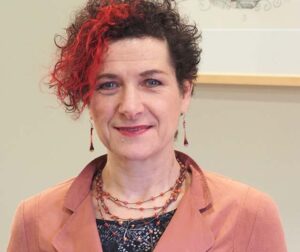Research group is working with museums to respond to legacies of violence and injustice

A research network that includes Dr. Dorota Glowacka, professor of Humanities and director of King’s Contemporary Studies Program, has been awarded a 7-year, $2.5 million dollar Partnership Grant by the Social Sciences and Humanities Research Council of Canada (SSHRC). The research network, Thinking Through the Museum (TTTM) has been awarded the funding for the project “Thinking Through the Museum: A Partnership Approach to Curating Difficult Knowledge in Public.”
TTTM brings together international scholars, students, museum professionals, and community representatives from 20 museums, universities, and NGOs in Canada, the Netherlands, Poland, South Africa, and the United States to work in five thematic research groups that amplify perspectives under-represented in the museum world: Critical Race Museology, Museum Queeries, Unsettling and Indigenizing Museology, National Heritage and Traumatic Memory, and Children’s Museology. Dr. Glowacka is a collaborator in the National Heritage and Traumatic Memory research cluster.
Pressure on museums to work for social justice in light of the Black Lives Matter, Rhodes Must Fall, and #MeToo movements, as well as Canada’s Truth and Reconciliation Commission’s Calls to Action and the Covid-19 and refugee crises, are among the motivations for TTTM’s work. Going beyond traditional academic approaches of arm’s-length criticism, TTTM collaborates across sectors to creatively respond to colonial and other oppressive legacies. The team will work within museum settings to co-produce exhibitions and design tools to challenge elite institutional knowledge systems, and beyond their walls to explore alternative heritage mobilization in festivals, grassroots archives, and site-based curating, where communities can set their own agendas.
Glowacka’s first project for the grant involves organising a joint workshop between the Jack, Joseph and Morton Mandel Center for Advanced Holocaust Studies at the United States Holocaust Museum (USHMM) and the Smithsonian National Museum of the American Indian (NMAI). The tentative title of the workshop is “The Intersections of the Holocaust and settler colonial genocides in North America: the role of material cultures in transgenerational transmission of memory and trauma, and in cultural preservation. New theories and practices.”
Set to take place in May 2023, in Washington, D.C., the workshop will bring together scholars of settler colonial genocides and Holocaust scholars, museum practitioners, and Jewish and Indigenous community members to discuss the key similarities, differences, and tensions between these two genocidal histories, with the goal of generating new knowledge and promoting inter-institutional learning. The workshop is meant to be a starting point for future academic and community-oriented initiatives and collaborations between the two institutions.
Concordia University is the Host Institution for the Partnership, which will be based at the Curating and Public Scholarship Lab under the direction of TTTM’s Principal Investigator Dr. Erica Lehrer. “We’re thrilled at this opportunity, which comes at a critical moment in the museum world,” Lehrer said. “Systemic change takes time, and our seven-year framework—along with the resources we bring together—will permit experimentation and training beyond what museums or universities could do alone.”
TTTM’s leadership consists of five scholars representing four Canadian universities: Shelley Ruth Butler (McGill), Angela Failler (University of Winnipeg), Heather Igloliorte and Erica Lehrer (Concordia University), and Monica Eileen Patterson (Carleton University). The full list of team members and partner organizations can be found on the SSHRC website.
Glowacka is also part of the research cluster Counter Memory Activism, an SSHRC-funded partnership between King’s and NSCAD University, described as “an interdisciplinary research-creation project between artists, museologists, curators, and scholars of genocide and memory studies, exploring the current questions and historical context of memory activism, as well as broader themes such as collective memory and the commemoration of heritage and difficult histories.”
Contact capsl@concordia.ca to be added to the TTTM mailing list.
Image: Dsdugan, CC0, via Wikimedia Commons

